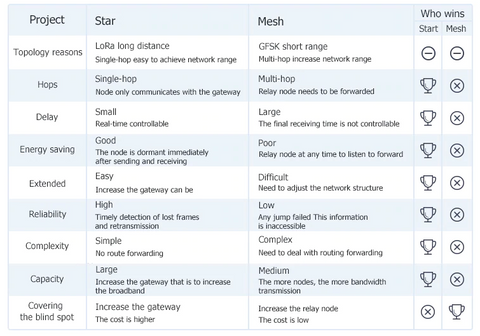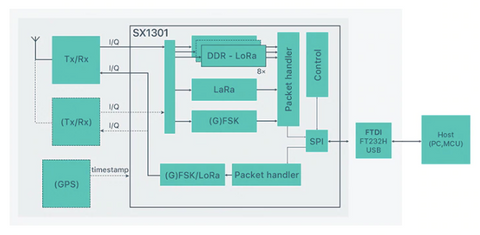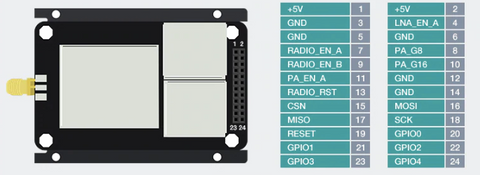
RAK831 and FT2232H Gateway Concentrator Module Kit for LoRa® (based on SX1301)
Sign up for restock notifications
RAK831 LoRA Gateway Module
The RAK831 is used to achieve a large area of low-cost full coverage IoT integration. It has strong anti-interference, good concealment, and long communication distance
- Brand Name: RAK
- Compatible Brand/Model: None
- Model Number: RAK831
- Type: Lora Gateway Concentrator Module Kit
- Dimension: 80mm*50mm*5mm
- Frequency Band: 433MHz/868MHz/915MHz
- Radio Chipset: SX1301
Kit Contains
- RAK831
- FT2232H Module
- Mini USB
- Antenna
- Casing
- Dupont cables
LoRa Gateway Frequency Band
- 433MHz - 435MHz
- 465MHz - 475MHz
- 865MHz - 872MHz
- 902MHz - 928MHz
What is RAK831? (LoRa Gateway Module)
RAK831 is an RF front end of a LoRa gateway. It is able to receive on different frequency channels at the same time and is able to demonstrate the LoRa signal without knowledge of the used spreading factor of the sending node.
With the compact design, this is an ideal modular product that helps you realise the whole LoRa system development. With the USB-SPI converter module FT2232, you can quickly develop software on your computer. You can also integrate the concentrator module into your own production product to realise the LoRa gateway function. This is a very economical way to create a LoRa gateway for a huge variety of applications like Smart Grid, intelligent farming, and other IoT applications.
The RAK831 needs a host system like a Raspberry Pi or WisAP (openWRT based) or WisCam for proper operation. The host processor can be a PS or MCU that will be connected to RAK831 via USB or SPI.
Why do we need LoRa gateways?
Public utilities (gas and other instruments, municipal pipelines, street lamps, landfills), large areas of livestock and agricultural irrigation, extensive layout and harsh weather, hydrology, mountain data collection, mines and remote outdoor operations; they suffer from…
- Insufficient signal coverage - low strength and cannot guarantee data stability.
- Power consumption - It is difficult to have a sustainable power supply in harsh environments.
- Low economic efficiency - Low utilization rate, occupation of network resources, high cost.
LPWAN Solution
LPWAn is a very good solution to the above problems
Complex urban environments can transfer 3 km and open area transmissions can be up to 15 km, penetrating harsh environments to transmit signals.
Sleep/low power mode means power consumption is very low
Supports narrowband data transmission resulting in low cost of network communications.
Supports 8 channels (LoRa Gateways create LPWAN IoT Network)
For example, 7 LoRa Gateway modules can cover the Lower Manhattan area
Key Features
- Based on Semtech SX1301
- Sensitivity down to -142.5 dBm
- Frequency bands 433MHz/868MHz/915MHz
- 433MHz with 2x SX1255 as Tx/Rx front ends
- 868/915MHz with 2x SX1257 as Tx/Rx front ends
- USB & SPI interface
- Output power level up to 23 dBm
- Range up to 15 km (Line of Sight)
- RF interface optimised to 50ohm allowing for simple system integration
- Supports 8 channels
- Temperature range from -40 to 85 degrees
- Compact size 80.0 x 50.0 x 5.0mm
- HAL is available form
LoRaWAN
LoRaWAN communication protocol can handle node roaming, base station capacity management, node authentication and other cellular technology requirements, and because of its openness, a large number of R&D companies in the world continuously update and improve the LoRaWAN communication protocol.
Due to the high range a star topology can be used. Compared Star and Mesh topology, we can see the advantages of LoRaWAN on the wireless network.

SX1301 Chip

- Up to -142.5 dBm sensitivity with SX1257 Tx/Rx front end
- 70 dB CW interferer rejection at 1 MHz offset
- Able to operate with negative SNR, CCR up to 9 dB
- Emulates 49x LORA demodulators and 1x (G)FSK demodulator
- Dual digital TX&RX radio front end interfaces
- 10 programmable parallel demodulation paths
- Dynamic data-rate (DDR) adaption
- True antenna diversity or simultaneous dual-band operation
- Any combination of spreading factor and intermediate frequency for up to 8 packets is possible
Pinout Description

Parameter
| Operating Voltage | DC 5V |
|---|---|
| Operating Temperature | -40 to 85 |
| Radio Chipset | SX1301
|
| RF Output Power | 23dbm |
| Input Signal | Not more then -13dBm |
| GPS Receiver | Optional |
| Receiver Sensitivity | Up to -142.5dBm (@293bps) |
| SNR Handling | 9dB |
| Control Interface | SPI |
| Dimension | 80mm*50mm*5mm |
| Firmware | Gateway HAL |
| Range | up to 15KM |
Potential applications
- Wireless Star Networks
- Remote controls
- Smart metering
- Wireless Sensor
- Wireless alarm and security systems
- M2M
- IoT
- Home/Building/Industrial automation
Documentation
- How to connect RAK831 to FT2232HL Quick Start
- Getting Started with RAK831 & Raspberry Pi
- Hackster.io Getting Started Guide






















